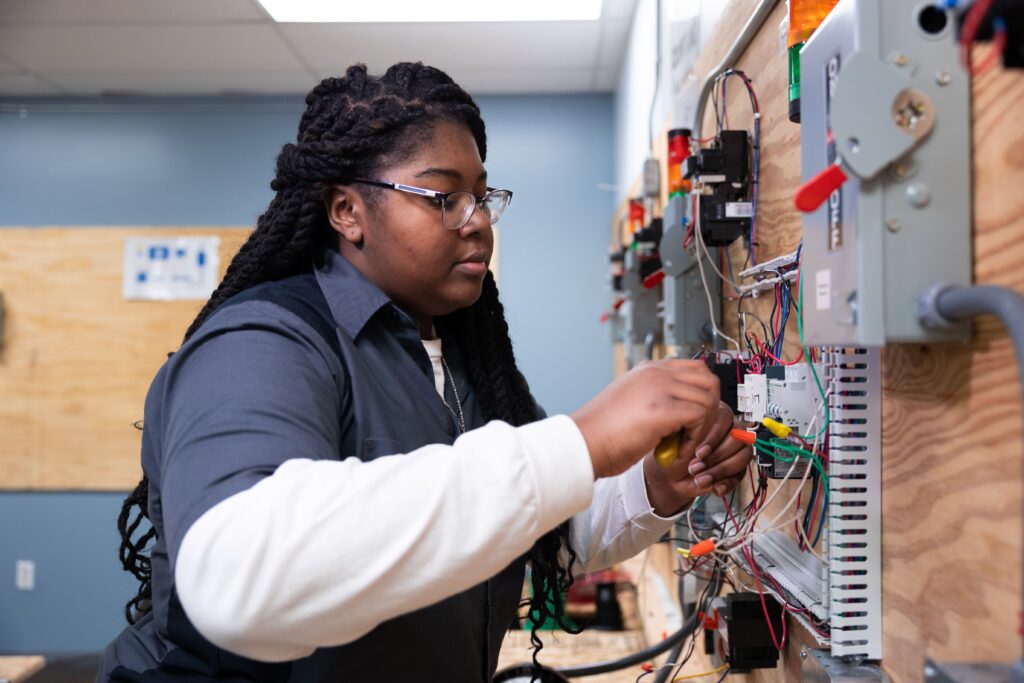Electricians are essential professionals who ensure the safe and efficient operation of electrical systems in homes, businesses, and industries. With the growing demand for reliable electricity and advancements in technology, the need for skilled electricians continues to rise. If you enjoy problem-solving, working with your hands, and ensuring safety, becoming an electrician can lead to a rewarding and stable career.
Here’s how to become an electrician and start your journey toward this essential profession.
Understand the Work of an Electrician
Before embarking on this career, it is important to understand what being an electrician entails. Electricians are responsible for installing, repairing, and maintaining electrical systems. These systems can include wiring, outlets, circuit breakers, and electrical panels in residential, commercial, or industrial settings. The job involves ensuring electrical systems meet safety standards and comply with local electrical codes. Electricians may specialize in different areas, such as residential, commercial, or industrial electrical work, but all roles require precision, attention to detail, and strong troubleshooting skills.
Obtain the Necessary Education
To begin your career, you typically need at least a high school diploma or equivalent, with a solid foundation in mathematics and physical science. These subjects are essential because the work of an electrician involves technical calculations, such as determining the correct wire size, voltage, and electrical load.
After completing your high school education, aspiring electricians often pursue further training at a technical college or vocational training center. Many institutions offer courses in electrical engineering or related fields that cover topics such as electrical systems, wiring techniques, and safety practices. Completing these programs provides the foundational knowledge required for an electrician career.
Complete an Apprenticeship or Learnership
Practical experience is crucial for becoming an electrician. In many countries, including South Africa, you must complete an apprenticeship or learnership program. These programs combine classroom education with hands-on training under the supervision of qualified electricians. Apprenticeships typically last three to four years and provide real-world experience in electrical installation, maintenance, and troubleshooting.
During this time, you’ll learn how to work with electrical tools, read blueprints, install electrical systems, and ensure safety measures are met. An apprenticeship gives you the opportunity to apply what you’ve learned in the classroom to real electrical projects, building your skills and confidence.
Get Licensed and Certified
In many countries, including South Africa, electricians must be licensed to work independently. After completing the required training and apprenticeship, you will need to pass a trade test to demonstrate your competency. In South Africa, the Department of Employment and Labour oversees the licensing process, which includes a written and practical exam.
Once you pass the trade test, you will receive a wireman’s license, which legally allows you to perform electrical work. Licensing is crucial to ensure you are competent, understand safety regulations, and can adhere to local electrical codes. It also gives clients and employers confidence in your skills and professionalism.
Develop Important Skills
Beyond technical knowledge, electricians need several important skills to succeed in their roles. These include:
- Attention to Detail: Identifying and fixing electrical faults requires precision and focus.
- Problem-Solving: Diagnosing and resolving complex electrical issues is a critical skill.
- Communication: As an electrician, you will often work with clients, contractors, and engineers. Good communication ensures that projects run smoothly.
- Teamwork: Electricians often collaborate with other tradespeople on larger projects, so teamwork is key.
- Physical Fitness: The job sometimes requires physical tasks such as climbing, lifting, and bending. Physical fitness is beneficial for handling these demands.
Developing these skills will help you not only perform your job effectively but also excel in the profession.
Stay Updated with Technology and Safety Standards
The electrical field is constantly evolving with new technologies and safety standards. With the rise of renewable energy systems, smart home technology, and advanced electrical components, it is essential for electricians to stay informed about new trends and developments. Continuing education through workshops, short courses, and professional development programs will help you stay competitive in the field.
In addition to technological advancements, it’s essential to keep up to date with local electrical codes and safety regulations. This ensures compliance with legal standards and helps protect lives by ensuring that electrical work is done safely.
Becoming an electrician requires dedication, training, and the right skills. By following this guide on how to become an electrician, you can start on a career path that offers stability, hands-on work, and opportunities for self-employment. With the right education, apprenticeship, licensing, and ongoing professional development, you can enjoy a rewarding and respected career in the electrical industry.
Also Read:How to Become an Emirates Flight Attendant: A Step-by-Step Guide











